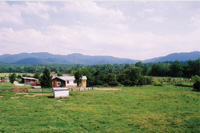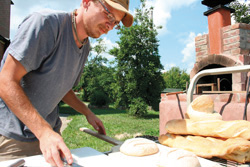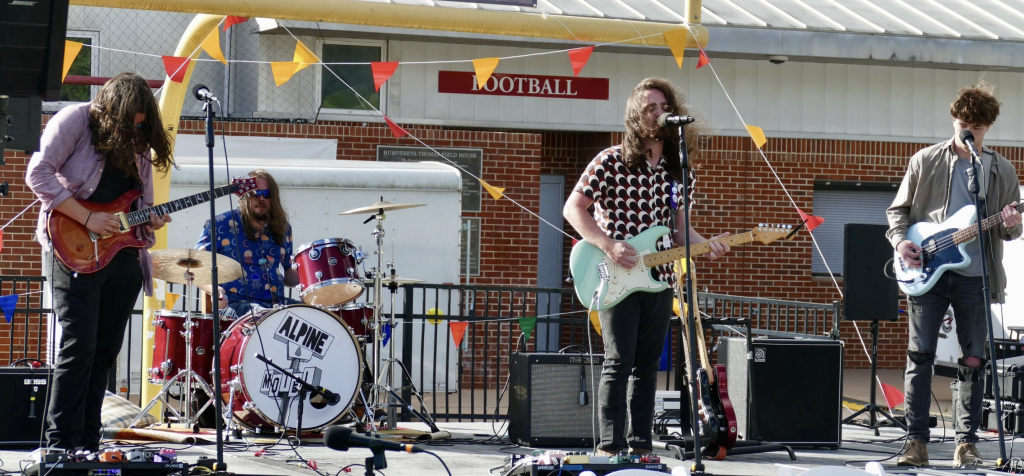Education: Appalachian Colleges Plant Seeds of Sustainability
By Meg Holden
Many colleges and universities incorporate sustainability lessons into the classroom, but some exceed expectations. Take a look at three Appalachian schools that teach conscientious food habits through student-centered gardens.
Warren Wilson College

Warren Wilson College's farm in North Carolina's Blue Ridge Mountains raises livestock for sale and for use in the college dining facilities.
One of the greenest small colleges in the South, Warren Wilson College in Asheville, N.C., is known for its “above and beyond” attitude toward sustainability practices. Primary among those practices is the college’s farm, where students raise cattle, hogs and cereal crops without pesticides or herbicides.
“Sustainable, local, ethical food is what attracted me to the school,” said Lucas Blanchard-Glueckert, who plans to attend Warren Wilson in the spring. “Having a campus farm means that the school is preparing their sustainable agriculture majors with real experience in a way that most other schools can’t.”
Senior social work major Nathan Cogsdale has worked on the Warren Wilson Farm for almost two years.
“Working on the farm makes me feel more connected to the process of food production,” Cogsdale said. “The primary lesson of working with animals is an understanding of the energy and mindset that it takes to raise animals to eat. Everyone who works on the farm becomes very aware of what they consume.”
Warren Wilson’s dining services are committed to using locally-grown foods, especially those grown on campus. All the beef and pork used in Gladfelter, the college’s main dining hall, comes straight from the campus farm. The student-run Cowpie Cafe uses home-grown produce in their vegetarian fare.
“Sustainable agriculture is really something the college is committed to,” said Blanchard-Glueckert. “It’s not just a sustainability bandwagon they’re jumping on.”
Berea College

Students at Berea College in Kentucky learn agricultural management skills for school and for life. Photo Courtesy of Sean Clark.
In 1881, Edward Henry Fairchild, then-president of Berea College, said, “I do not think (the college garden) can be made successful … I can make a good garden but I have never seen a student who could do it.”
Students at the school in Berea, Ky., have been working to prove Fairchild wrong for the past 130 years. Today, student workers on the campus farm raise and sell livestock such as cattle, hogs and goats.
The campus gardens and greenhouse have a more horticultural aspect. Here, students grow organic vegetables, fruits, mushrooms and garden plants. The food produced in the gardens and greenhouse are distributed to the campus food service, Berea Farmer’s Market and local restaurants and stores.
Students in Berea’s agricultural and natural resource (ANR) department gain work and management experience through the college farms. ANR majors work with field and horticultural crops, livestock, the field mill and other farm equipment. Upperclassmen have the opportunity to become enterprise managers and take charge of various aspects of the farm. Whether they move on to careers in farming or pharmaceuticals–or anything in between–the farm at Berea prepares graduates for sustainable, ethical lives.
University of Virginia
At the University of Virginia (UVa) in Charlottesville, students uphold founder Thomas Jefferson’s agricultural traditions. UVa’s community gardens, started by a studentinitiative, model organic practices for the university and Charlotttesville community.
The first garden was started in 2009 in a space near the center of campus. The garden size increased nearly 100 percent in the past year with the addition of a new garden plot behind the university’s biology and psychology building. The new plot is fertilized with compost made from waste from UVa’s dining facilities/halls.
“In a way (the garden is) just a natural part of the sustainability agenda,” said professor Tim Beatley to local paper C-Ville. “We are thinking about how do you sustain, how do you support a growing global population on fewer resources, less land, and how do you do it in a way that will protect the resource base, and that’s essentially what sustainability is about.”
With such a forward-thinking approach and rapid adoption of garden space, we may find the university buried in tomato plants by next year.
Educational Alternatives Support a Sustainable Childhood
By Meg Holden
For parents who have the time—and the energy—homeschooling and “unschooling” allow children more freedom than a traditional classroom. Many families use this freedom as a way to incorporate lessons, such as sustainability, that would not be emphasized the same way in a public school classroom.
Kelli Haywood, a self-described “mother, writer and homesteader,” homeschools her two daughters in eastern Kentucky.
“While we all probably have multiple answers to the question of why we chose homeschooling, I believe I am safe to say that all of us felt compelled to do so by the obligation we have to our children as their parents,” wrote Haywood on her blog, A Mountain Mama. Haywood incorporates field trips, the family garden and chickens and the support of a local homeschooling group into her homeschooling curriculum.
So for those of you who have the ability and opportunity to homeschool, try including one small action that can get your child moving outside and thinking about sustainability.
Read Haywood’s blog at eastkentuckygal.wordpress.com.
Sequatchie Valley Institute: A Permaculture Learning Center
By Julie Johnson
Spanning over 300 acres on east Tennessee’s Cumberland Plateau, the Sequatchie Valley Institute (SVI) exemplifies permaculture living integrated into a forest environment.
Since SVI began as a homestead in 1971, visitors have come to learn about sustainable living and land conservation. Over 1,000 people attend the institute’s meetings, workshops and conferences yearly.
Visitors find buildings made of cob and straw and powered by the sun. SVI’s Moonshadow community is a living model of sustainable homemaking surrounded by four acres of edible landscaping.
On October 7, SVI will host a three-day solar energy installation workshop covering many aspects of solar panel design and installation. For more information on this workshop and the Sequatchie Valley Institute, visit svionline.org.
Related Articles
Latest News

Leave a comment
Your email address will not be published. Required fields are marked *




